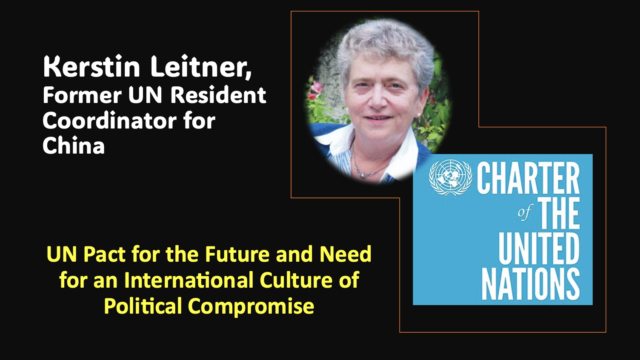The UN Pact for the Future affirms that action will be taken in accordance with the obligations of international law – including the UN Charter, its mandate, and its principles. But, the language in the UN Charter remains general. Equating the provisions of the Charter with the provisions of international treaties is roughly like equating a national constitution with national laws. But, the provisions of the constitution provide the guidelines for laws and political action. It is, or should be, similar to the UN Charter and international treaties and conventions.
The UN Charter recognizes that there are conflicts and military and violent threats. Chapter VI describes the steps that the Security Council must take in the event of a threat to international peace. It is not the task of the Security Council to avoid or end the conflict, but rather to identify steps that will lead to a peaceful settlement of the conflict by the conflicting parties. The Security Council’s proposals are binding on the conflicting parties and their supporters, as well as on all other UN member states (Article 25). If a member of the Security Council is a party to the conflict, its representative must abstain from voting on the basis of Chapter VI Article 27.3 with consideration of article 52.3. In other words, if the members of the Security Council had decided to deal with Russia’s attack on Ukraine under Chapter VI, Russia would not have been able to veto it.
In the conflict between Israel and Hamas, there are clear provisions in the UN Charter. According to Article 51, every member state has the right to self-defence and every people has the right to self-determination (Article 1.2). But the right to self-defence only exists without restriction as long as the Security Council has not made a decision on how to end the conflict. Israel and Hamas should have agreed to a ceasefire at the latest since the unanimous Security Council Resolution 2735 of June 10, 2024.
The reasons for the non-compliance with Security Council resolutions are complex. Here are just a few suggestions as to how the authority of the United Nations could be strengthened. That it needs to be strengthened is not really in doubt in today’s multipolar world. It is just that all the major powers are adopting a wait-and-see attitude, because no one wants to be hasty in putting national interests aside. Russia is even prepared to go further and give national interests a higher priority than the general international and global interest. This contradicts the provisions of the UN Charter. The Secretary-General and the General Assembly are now called upon to overcome the fundamental disagreement of the alliance of 15 member states led by Russia.
A culture of political compromise
To do this, we must revive an international culture of political compromise. We have the ambition to find win-win solutions, but what would these look like in the case of the conflict between Russia and Ukraine, between Israel and the Palestinians? Not only the Security Council, but other bodies are called upon to uncover the roots of the conflicts through an in-depth analysis in order to then enable a negotiation process between the conflicting parties. The causes of the conflict must be eliminated step by step with patience and perseverance. The Security Council must ensure that all parties are treated equally. Because there is only one way to international peace: the interests of all those involved must be considered and treated equally.
What is particularly lacking in today’s politics is the tolerance described in the UN Charter and the respect for the historically grown differences of countries. Not only the governments, but also the citizens in all countries follow different ideas about national governance. The challenge is to respect these and still find common action.
Since the UN continues to be attractive to the majority of countries, we should use this opportunity to reorganize the United Nations system. The Pact for the Future can be an important step in this direction, but even more important would be the convening of a General Conference under Article 109 of the Charter. But for this to happen, the above-mentioned disagreement must first be addressed and overcome.(23/10/2024)





